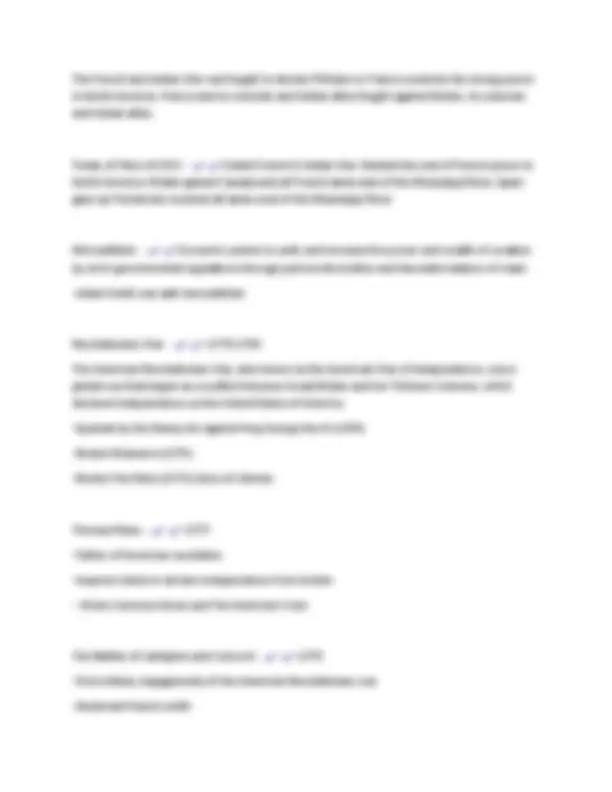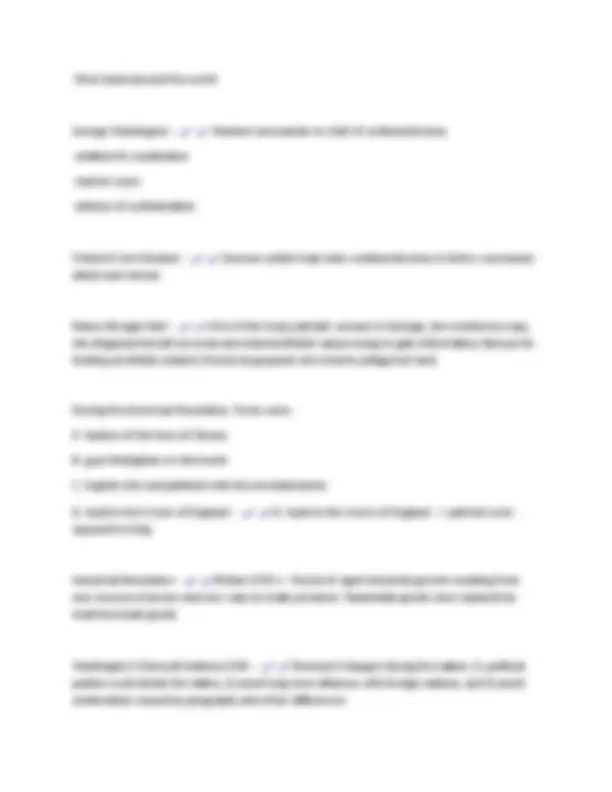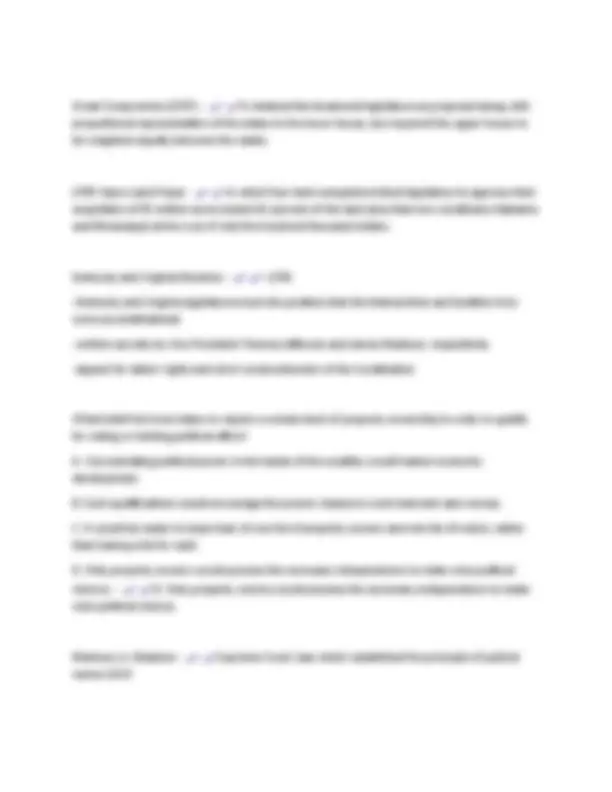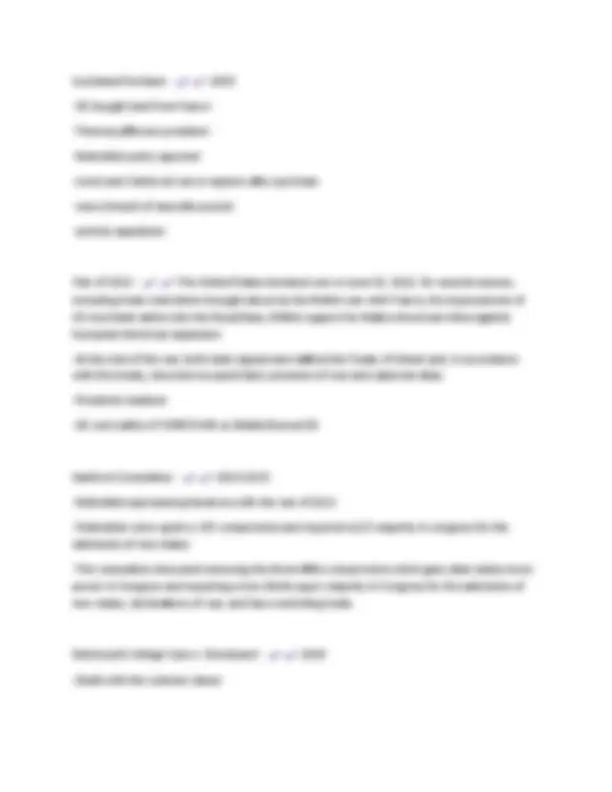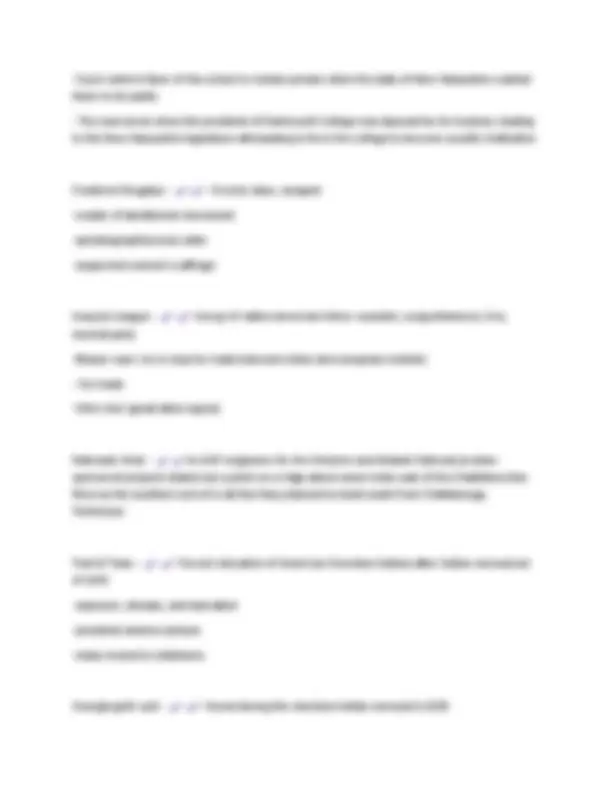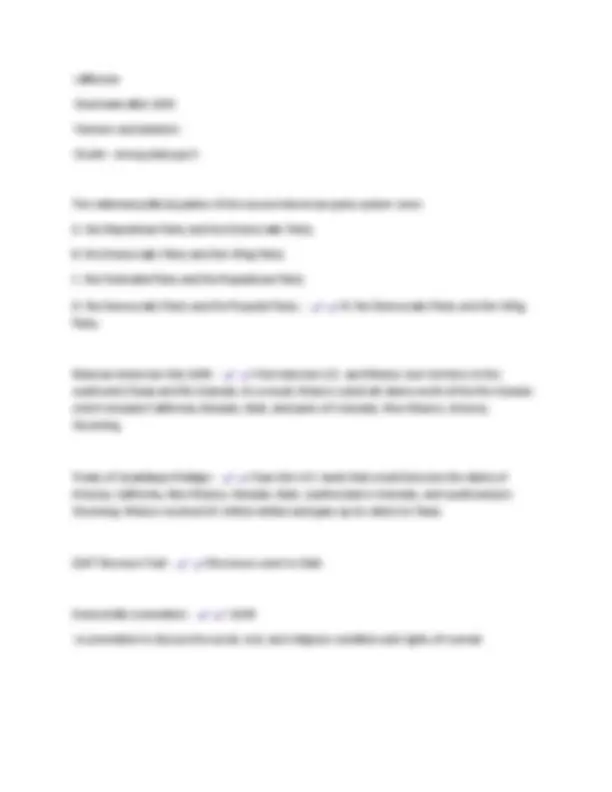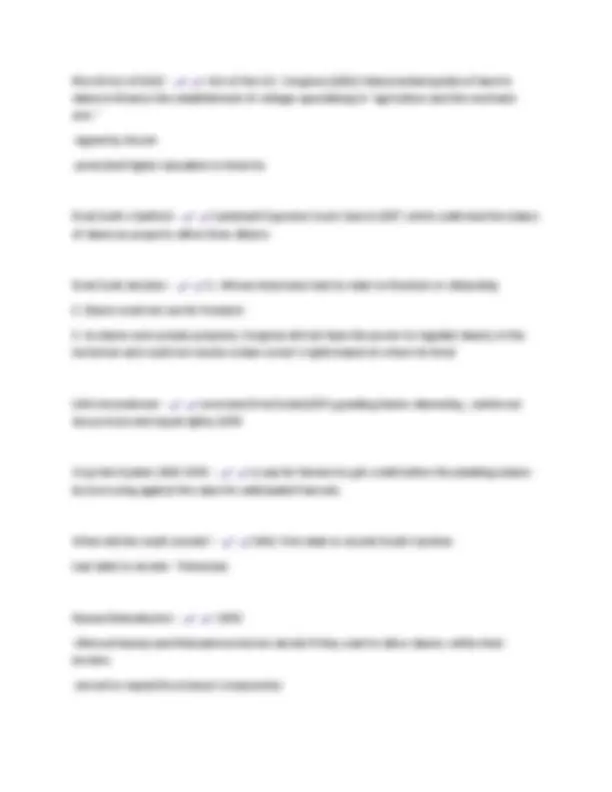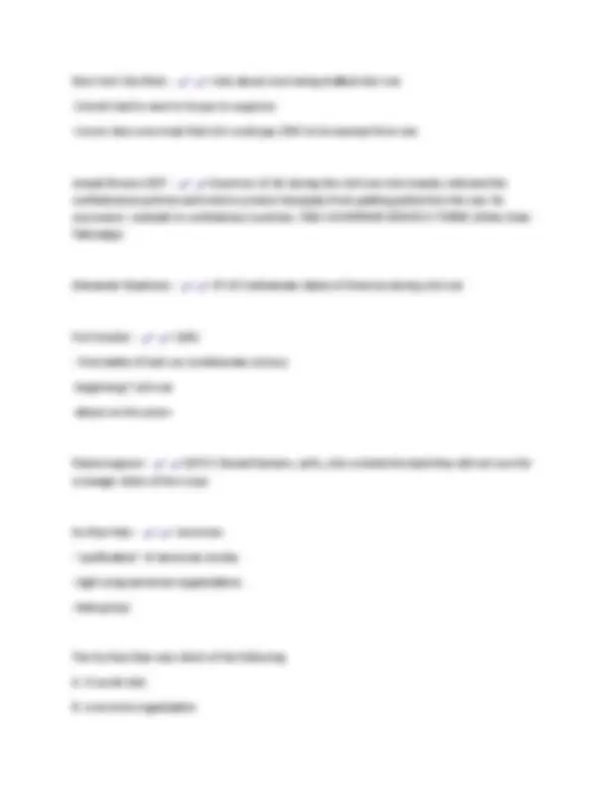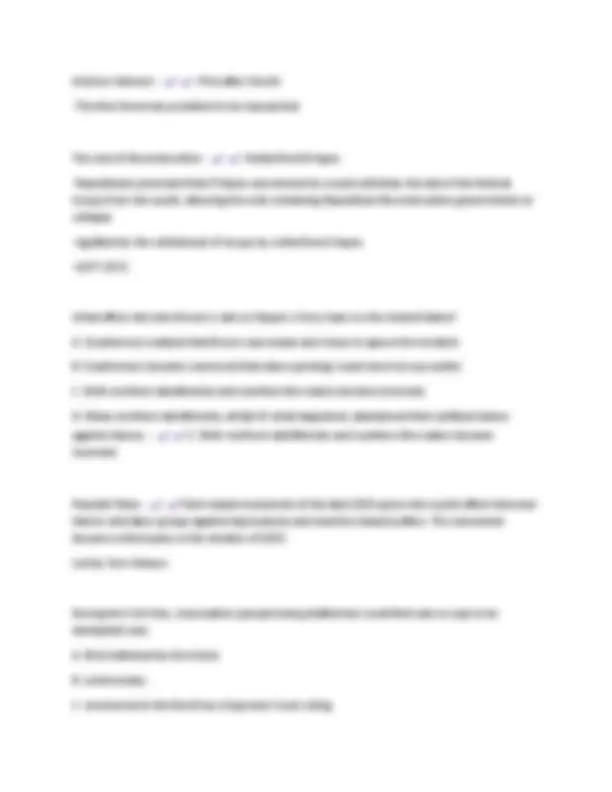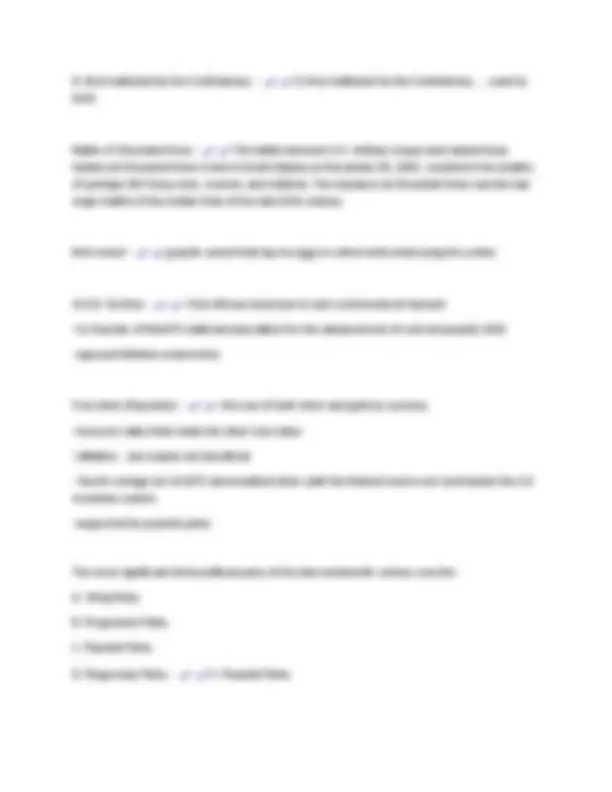Download UGA History Exemption Test Pre 1877/quick and easy study 2025 and more Exams History in PDF only on Docsity!
UGA History Exemption Test Pre 1877/quick and
easy study 2025
Hernan Cortes - Spanish explorer who marched across mexico and conquered the aztecs
- from spain Hernando de Soto - - explored deep in USA
- first to cross and disocer Miss. River
- claimed for Spain Jamestown - - First permanent English settlement
- Starving time (1609-1610 80% died)
- 1619: first slave ship of africans
- 1640: modern concept of slavery was established in US Why did colonists come to the New World? - Religious freedom profit adventure...etc. William Penn - - Founder of Pennsylvania
- Pushed for democracy and religious freedom
- Quaker
- Wanted to unite all of the U.S. colonies What country claimed Quebec? - The French
Who settled land west of the Mississippi River A. The French B. The Dutch C. The Spanish D. The British - A. The French Who settled land in New York - The Dutch along Hudson River later colonized New Amsterdam on Manhattan Island. Main cash crop of Chesapeake Bay (Virginia and Maryland) - Tobacco ??? Early settlers wanted main crop to be ______ , ended up being _______ - wine/silk and rice/indigo Later cash crops became tobacco and cotton King Phillip's War - Most Indians lost in New England King Philip's War was an armed conflict between American Indian inhabitants of New England versus the New England colonists and their Indian allies in 1675- 78 Bacon's Rebellion - - armed rebellion in 1676 by Virginia settlers led by Nathaniel Bacon against the rule of Governor William Berkeley.
- First rebellion in the colonies Many of the European settlers who first came to the New World did so to escape religious persecution. Which colony was granted to a benefactor for the purpose of settling the Quakers? A. Virginia
The French and Indian War was fought to decide if Britain or France would be the strong power in North America. France and its colonists and Indian allies fought against Britain, its colonists and Indian allies. Treaty of Paris of 1763 - Ended French & Indian War. Marked the end of French power in North America. Britain gained Canada and all French lands east of the Mississippi River. Spain gave up Florida but received all lands west of the Mississippi River Mercantilism - Economic system to unify and increase the power and wealth of a nation by strict governmental regulations through policies like bullion and favorable balance of trade
- Adam Smith was anti-mercantilism Revolutionary War - - 1775 - 1783 The American Revolutionary War, also known as the American War of Independence, was a global war that began as a conflict between Great Britain and her Thirteen Colonies, which declared independence as the United States of America.
- Sparked by the Stamp Act against King George the III (1765)
- Boston Massacre (1770)
- Boston Tea Party (1773) (Sons of Liberty) Thomas Paine - - 1777
- Father of American revolution
- Inspired rebels to declare independence from britain
- Wrote Common Sense and The American Crisis The Battles of Lexington and Concord - - 1775
- First military engagements of the American Revolutionary war
- lieutenant francis smith
- Shot heard around the world George Washington - - Named commander in chief of continental army
- drafted US constitution
- marine corps
- articles of confederation Friedrich Von Steuben - German soldier help train continental army to follow commands attack and retreat Nancy Morgan Hart - One of the most patriotic women in Georgia, she worked as a spy; she disguised herself as a man and entered British camps trying to gain information; famous for holding six British soldiers (Tories) at gunpoint who tried to pillage her land During the American Revolution, Tories were: A. leaders of the Sons of Liberty. B. guerrilla fighters in the South. C. English who sympathized with the revolutionaries. D. loyal to the Crown of England. - D. loyal to the Crown of England. - > patriots were opposed to King Industrial Revolution - Britain 1720's - Period of rapid industrial growth resulting from new sources of power and new ways to make products. Handmade goods were replaced by machine made goods Washington's Farewell Address 1706 - Stressed 3 dangers facing the nation: 1) political parties could divide the nation, 2) avoid long term alliances with foreign nations, and 3) avoid sectionalism caused by geography and other differences
- Madison discusses the means of preventing rule by majority faction and advocates a large, commercial republic James Madison - Considered "Father of the Constitution" because of his role in its writing and ratification. Wrote Bill of Rights. One of the authors of the Federalist Papers. President during War of 1812 Northwest Ordinance - - 1789
- An Ordinance for the Government of the Territory of the United States, North-West of the River Ohio
- First organized territory of the US
- Began westward expansion
- This division helped set the stage for national competition over admitting free and slave states Iroquois league - five tribes to form the Indian confederation called the Iroquois League. Eli Whitney - Invented the cotton gin, 1793 All of the following were consequences of Eli Whitney's invention of the cotton gin, except: A. the urbanization of the southern economy. B. the strengthening of slavery in the southern states. C. the development of an American textile industry. D. the spread of cotton as a cash crop in the southern states. - A. the urbanization of the southern economy. Cotton Gin - machine which automated cotton processing and INCREASED the need for slaves
Great Compromise (1787) - It retained the bicameral legislature as proposed along with proportional representation of the states in the lower house, but required the upper house to be weighted equally between the states. 1795 Yazoo Land Fraud - in which four land companies bribed legislators to approve their acquisition of 35 million acres (nearly 60 percent of the land area that now constitutes Alabama and Mississippi) at the cost of only five hundred thousand dollars. Kentucky and Virginia Resolves - - 1798
- Kentucky and Virginia legislatures took the position that the federal Alien and Sedition Acts were unconstitutional.
- written secretly by Vice President Thomas Jefferson and James Madison, respectively.
- argued for states' rights and strict constructionism of the Constitution. What belief led most states to require a certain level of property ownership in order to qualify for voting or holding political office? A. Concentrating political power in the hands of the wealthy would hasten economic development. B. Such qualifications would encourage the poorer classes to work hard and save money. C. It would be easier to keep track of one list of property owners and one list of voters, rather than having a list for each. D. Only property owners would possess the necessary independence to make wise political choices. - D. Only property owners would possess the necessary independence to make wise political choices. Marbury vs. Madison - Supreme Court case which established the principle of judicial review 1803
- Court ruled in favor of the school to remain private when the state of New Hampshire wanted them to be public
- The case arose when the president of Dartmouth College was deposed by its trustees, leading to the New Hampshire legislature attempting to force the college to become a public institution Frederick Douglass - - Former slave..escaped
- Leader of abolitionist movement
- autobiographies best seller
- supported women's suffrage Iroquois League - - Group of native american tribes: wyandot, susquehannock, Erie, neutral party
- Beaver wars: try to stop fur trade between tribes and european markets
- Fur trade
- Ohio river (great lakes region) Railroads West - In 1837 engineers for the Western and Atlantic Railroad (a state- sponsored project) staked out a point on a ridge about seven miles east of the Chattahoochee River as the southern end of a rail line they planned to build south from Chattanooga, Tennessee. Trail of Tears - - Forced relocation of American Cherokee Indians after indian removal act of 1830
- exposure, disease, and starvation
- president andrew jackson
- many moved to oklahoma Georgia gold rush - - found during the cherokee indian removal in 1838
Second party System - - 1828 - 54
- rising levels of voter interest
- democratic party lead by andrew Jackson
- Whig party lead by henry clay (national republicans) (Jacksonian era) Nullification Crisis - - 1832 - 33
- SC argued that the federal tariffs were unconstitutional
- Jackson sent troops to force SC to pay tariffs Gadsden Purchase 1853 - Gadsden Purchase, 1853-1854. The Gadsden Purchase, or Treaty, was an agreement between the United States and Mexico, finalized in 1854, in which the United States agreed to pay Mexico $10 million for a 29,670 square mile portion of Mexico that later became part of Arizona and New Mexico. Civil War 1861 - - 1861 - 1865 between North (Union) and South (Confederate) to determine survival of union or independence of the confederacy
- North Disagreed with slavery while south supported it. Confederates attacked Fort Sumter over slavery (Prez Lincoln) North Strengths and Weaknesses - Strengths:
- superior leadership in Abraham Lincoln
- greater population - 22 million people
- military power - a five to two advantage in men who could fight, a navy, war machinery
- more factories more money more railroads
- Jefferson
- Dominate after 1800
- Farmers and planters
- South-- strong state gov't The national political parties of the second American party system were: A. the Republican Party and the Democratic Party. B. the Democratic Party and the Whig Party. C. the Federalist Party and the Republican Party. D. the Democratic Party and the Populist Party. - B. the Democratic Party and the Whig Party. Mexican American War 1846 - War between U.S. and Mexico over territory in the southwest (Texas and Rio Grande). As a result, Mexico ceded all claims north of the Rio Grande which included California, Nevada, Utah, and parts of Colorado, New Mexico, Arizona, Wyoming, Treaty of Guadalupe Hidalgo - Gave the U.S. lands that would become the states of Arizona, California, New Mexico, Nevada, Utah, southwestern Colorado, and southwestern Wyoming. Mexico received 15 million dollars and gave up its claims to Texas. 1847 Mormon Trail - Mormons went to Utah Seneca falls convention - - 1848
- a convention to discuss the social, civil, and religious condition and rights of woman
Morrill Act of 1862 - - Act of the U.S. Congress (1862) that provided grants of land to states to finance the establishment of colleges specializing in "agriculture and the mechanic arts."
- signed by lincoln
- promoted higher education in America Dred Scott v Sanford - Landmark Supreme Court Case in 1857 which confirmed the status of slaves as property rather than citizens Dred Scott decision - 1. African Americans had no claim to freedom or citizenship.
- Slaves could not sue for freedom
- As slaves were private property, Congress did not have the power to regulate slavery in the territories and could not revoke a slave owner's rights based on where he lived. 14th Amendment - overruled Dred Scott(1857) granting blacks citizenship ; reinforced due process and equal rights; 1868 Crop-lien System 1860- 1930 - a way for farmers to get credit before the planting season by borrowing against the value for anticipated harvests When did the south secede? - 1861 First state to secede South Carolina Last state to secede - Tennessee Kansas Nebraska Act - - 1854
- Allowed kansas and Nebraska territories decide if they want to allow slavery within their borders
- served to repeal the missouri compromise
C. white supremacist group D. All of the above - D. All of the above KKK took positions such as white supremacy, white nationalism, anti-immigration, opposed Catholics and Jews Had 3 different manifestations over time Emancipation proclamation (1863) - - lincoln issued during the civil war, which made ending slavery a war goal.
- Gettysburg Address - A speech delivered by Abraham Lincoln during the Civil War. Lincoln was speaking at the dedication of a soldiers' Who assassinated Abraham Lincoln - John Wilkes Booth Battle of Gettysburg - - 1863
- The end of Robert E. Lee's confederate incursion North Jefferson Davis - - president of the Confederate states of america
- originally senator of Mississippi 13th Amendment - officially abolished and continues to prohibit slavery and involuntary servitude; 1864 End of Civil War - South surrendered at Appomattox court house Homestead Acts - - 1862
- United States federal laws that gave an applicant ownership of land, typically called a "homestead", at little or no cost
- Any adult who had never taken up arms against the U.S. government, could apply. Women, blacks, and immigrants were eligible. 460,000 - Number of slaves freed during and after the war Freedman's Bureau - The Bureau protected the legal rights of freedmen, negotiated labor contracts, and set up schools and even churches for them. Reconstruction era - - 1865 - 1877 the period after the Civil War in the United States when the southern states were reorganized and reintegrated into the Union Post Bellum Era - no slavery, crop-lien system, farmers found themselves mortgaging an implanted crop at an unspecified rate of interest for a loan of undetermined value. 15th Amendment - explicitly grants right of citizens to vote regardless of race, color or having been enslaved ; 1870 Segregation - a social system that provides separate facilities for minority groups Tunis Campbell - Prominent African American politician who represented McIntosh County as a state senator and served as a justice of the peace. Insisted on equal representation of blacks in juries. Freedmans Bureau Panic of 1873 - Nationwide depression
D. first instituted by the Confederacy. - D. first instituted by the Confederacy. ... used by both Battle of Wounded Knee - The battle between U.S. military troops and Lakota Sioux Indians at Wounded Knee Creek in South Dakota on December 29, 1890, resulted in the deaths of perhaps 300 Sioux men, women, and children. The massacre at Wounded Knee was the last major battle of the Indian Wars of the late 19th century. Boll weevil - grayish weevil that lays its eggs in cotton bolls destroying the cotton W.E.B. Du Bois - - First African American to earn a doctorate at harvard
- Co founder of NAACP( national association for the advancement of colored people) 1909
- opposed Atlanta compromise Free silver (Populism) - - the use of both silver and gold as currency
- incorrect ratios that made the silver lose value
- inflation... but maybe not beneficial
- fourth coinage act of 1873 demonetized silver until the federal reserve act overhauled the U.S monetary system.
- supported by populist party The most significant third political party of the late nineteenth century was the: A. Whig Party. B. Progressive Party. C. Populist Party. D. Mugwump Party. - C. Populist Party.
The Harlem Renaissance was: A. a new craze in urban planning inspired by the New York borough of the same name. B. an African-American literary and artistic movement. C. an architectural revival of Manhattan. D. a school of urban landscape painting. - B. an African-American literary and artistic movement.


